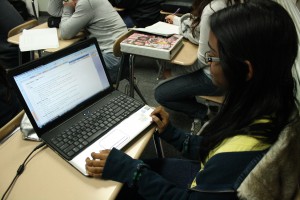
Story By Daphne Chen
Starting on Jan. 19, students and staff are allowed to bring personal laptops to school as part of a pilot program that is to last until spring break. The dangers of this “laptop initiative” are obvious – it’s a godsend for cheaters and bored students alike.
However, when The Sidekick talked to organizers Principal Brad Hunt, associate principal Gina Peddy and integration specialist Shalone Willms, it was clear that the direction this program takes it really up to the students.
As ever-cynical high school students, we had to express our skepticism first. It’s true that many students will be playing Minesweeper or stacking virtual cards rather than really utilizing laptops for an educational purpose, despite the blocks on certain Web sites. However, students who would do this would find a way to be distracted even if they didn’t have a laptop, and part of the responsibility for this does lie with the teachers and their efforts to engage and facilitate students.
Administrators also pointed out many had the same worries when they lifted the ban on cell phones during school, but is working well and students are much happier now.
And what about the positives of having laptops in school? Think: The power of Google in a classroom. The power to type notes – then distribute them to confused classmates. The power to really work on group projects in class, instead of planning to meet at the library later.
An editor on The Sidekick brought her laptop to school for two days. Although she was distracted by the lure of the Internet and did not use the laptop in most classes, she was also able to use her time efficiently in classes with teachers who spoke very quickly, and even managed to get some homework completed during the lulls in the lecture. She was even able to relax when she missed a bullet point because two seats in front of her, another friend was taking detailed notes on his laptop.
As Hunt put it, students shouldn’t have to “power down” when they come to school. By allowing us to bring laptops to school, the administration is not only placing their trust in us as a student body but also showing us how much they respect us. Hunt has even spoken about possibly lifting the blocks for sites like Facebook and YouTube in the future because of their use as 21st century educational tools, if students prove themselves capable.
A high school administrator who would consider letting students access Facebook during school? Do we really want to lose that chance?
Students now have a choice: we can either make the right decisions and act with the same amount of respect that they have given us, or we can show our administration just how immature we are by abusing their trust.
Your choice.








